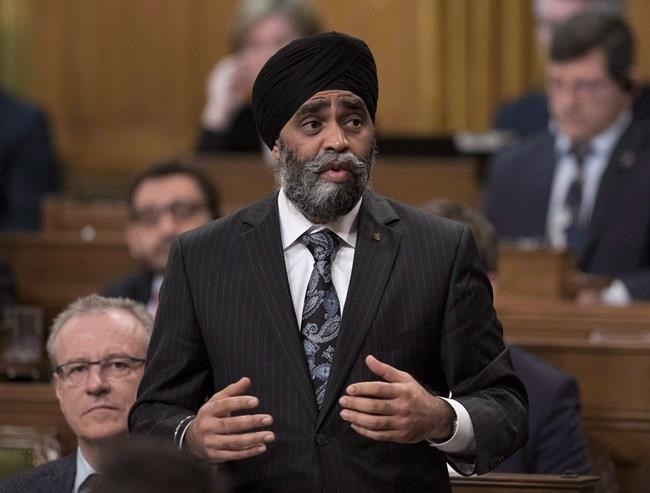
Minister of National Defence Harjit Sajjan rises during Question Period in the House of Commons on Parliament Hill, Friday, April 7, 2017 in Ottawa. Defence Minister Harjit Sajjan says he is truly sorry after claiming in a recent speech to have been the architect of Canada's largest battle in Afghanistan.
Image Credit: THE CANADIAN PRESS/Justin Tang
April 29, 2017 - 4:30 PM
OTTAWA - Defence Minister Harjit Sajjan offered a full apology to his former comrades-in-arms on Saturday, after claiming to have been the "architect" of Canada's largest battle in Afghanistan.
The mea culpa, posted to Facebook, followed what some had seen as a half-hearted apology by Sajjan on Friday for comments he made in a speech earlier this month to a think tank in India.
"On my first deployment to Kandahar in 2006, I was kind of thrown in an unforeseen situation and became the architect of an operation called Operation Medusa, where we removed about 1,500 fighters, Taliban fighters, off the battlefield," Sajjan said during his speech in Delhi on April 18.
Those comments, which were not improvised but part of a prepared speech for the event at the Indian think-tank Observer Research Foundation, reportedly sparked grumblings among some Afghan veterans.
The National Post, which first reported on Sajjan's speech, quoted several current and former soldiers who noted that Operation Medusa was actually planned and executed by then-major-general David Fraser, who at the time was responsible for all NATO forces in southern Afghanistan.
Sajjan was a major with the Canadian Forces in Afghanistan during Operation Medusa, and received a special commendation for "his understanding of counter-insurgency tactics," which helped the operation.
But the minister himself has acknowledged that Fraser and his command team were responsible for the operation's success, which saw hundreds of Taliban fighters killed or captured over a two-week period.
The minister initially expressed "regret" for overstating his role in the operation after video of his speech in India emerged this week, but he went farther in Saturday's Facebook post.
"I made a mistake in describing my role. I wish to retract that description and apologize for it. I am truly sorry," Sajjan wrote, before addressing his former comrades directly.
"While I am proud of the role I played during my deployments to Afghanistan, my comments were in no way intended to diminish the roles of my former superiors and fellow soldiers. To them I offer my sincere apologies."
Sajjan did not say why he overstated his role in Operation Medusa, which also saw 12 Canadian soldiers killed in what remains the bloodiest operation for the Canadian Armed Forces since Korea.
Despite the apology, the minister is expected to face pointed questions about his comments in India when members of Parliament return from a two-week break on Monday.
The opposition Conservatives, in particular, have latched onto the issue, saying they plan to raise questions about Sajjan's credibility and character.
The Conservatives have also accused the minister of misleading Canadians about the urgent need for Super Hornet fighter jets, and about the benefits available to military personnel deployed to Kuwait.
Chief of defence staff Gen. Jonathan Vance shut down questions about Sajjan's comments on Friday, as he was providing an update on the military's efforts to stamp out sexual misconduct.
"I'm not really aware of this case, and, quite frankly, I'd like us to keep our eye on the ball about sexual misconduct," Vance said when a reporter raised the issue, before refusing the reporter a second question.
Sajjan's apology for his comments on Operation Medusa capped a string of incidents that marred what was supposed to have been a homecoming of sorts to his native India, where he lived until he was five.
He was also forced to fend off allegations made by one Indian leader that he was a Sikh nationalist, and was drawn into a debate over whether the killing of hundreds of Sikhs in 1984 was a genocide.
News from © The Canadian Press, 2017